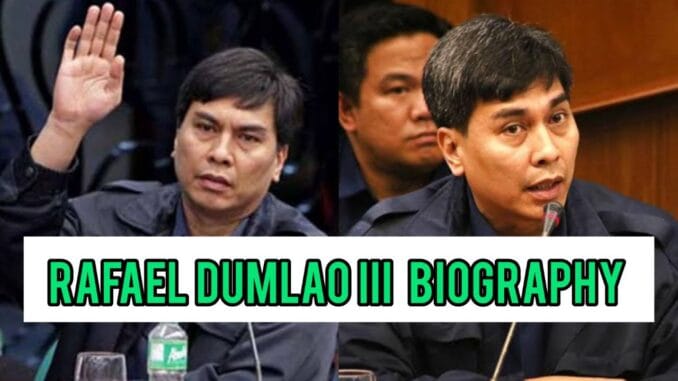
Rafael Dumlao III Biography
Rafael P. Dumlao III was born on April 16, 1971, in Cebu City, Philippines. He grew up in a close-knit family where public service and honor were deeply valued. Rafael excelled at school, particularly in leadership roles, and was admired for his calm confidence and willingness to help others. After graduating high school, Rafael set his sights on a career in the Philippine National Police (PNP). Rafael Dumlao III is 54 years old as of 2025.
His early years in Cebu introduced him to the challenges facing many Filipino communities, such as poverty and crime. Rafael often volunteered to tutor local youths and assist in neighborhood patrols organized by community leaders. These experiences deepened his understanding of grassroots concerns and fueled his ambition to become a police officer. At age twenty, he enrolled in the PNP Academy, where rigorous training tested his physical endurance and moral resolve. Upon graduation, he returned to his home region as a junior officer, ready to apply his skills to real-world policing and community engagement.
Rafael Dumlao III Career
Rafael Dumlao III’s career in the Philippine National Police spanned over two decades. He began as a patrol officer in Cebu City, where he quickly became known for his attention to detail and respectful treatment of citizens. Colleagues entrusted him with complex investigations, and superiors promoted him to higher ranks based on his consistent performance. By the early 2000s, Dumlao had been transferred to Manila and served in various units, including Criminal Investigation and Community Relations. His ability to balance firmness with fairness earned him respect from both civilians and fellow officers.
In 2013, Dumlao was appointed Police Superintendent and assigned to the now-defunct Anti-Illegal Drugs Group (AIDG) in Camp Crame. This elite unit was created to curb the country’s rising drug-related crimes. As a superintendent, he planned and led numerous raids, coordinated sting operations, and oversaw evidence gathering. His track record reflected a commitment to fighting narcotics syndicates, and he was often praised internally for his strategic thinking. He participated in joint operations with the Philippine Drug Enforcement Agency (PDEA) and international law enforcement partners, learning new investigative techniques and sharing best practices.
Outside of active operations, Dumlao attended seminars on criminal justice reform and human rights. He publicly spoke about the need for police accountability and community trust. In interviews, he described his vision of a modern PNP—one that balanced aggressive anti-drug measures with respect for due process. These statements positioned him as a progressive voice within the organization. However, his rapid rise in rank also placed him under greater scrutiny, and he faced the inherent pressures of working in a unit known for sensitive missions and high stakes.
Rafael Dumlao III Controversies
Rafael Dumlao III’s career took a dark turn on October 18, 2016, when South Korean businessman Jee Ick Joo was abducted from his Angeles City home. Jee, who lived in the Philippines for business, was taken by individuals posing as law enforcement officers conducting an anti-drug operation. They brought him to Camp Crame under Dumlao’s AIDG command, where he was str@ngled to death inside his own vehicle. The perpetrators then cremated Jee’s body and, in a shocking detail, flushed his ashes down a toilet at the headquarters. This brutal act outraged both Filipino and South Korean communities.
Investigations revealed that the abduction was a scheme to extort Jee’s family for an ₱8 million ransom. Although his relatives paid ₱5 million, Jee was never released. Witnesses and forensic evidence implicated Dumlao as the alleged mastermind. In June 2023, the Angeles City Regional Trial Court Branch 60 stunned observers by acquitting Dumlao of all charges. The decision sparked widespread disbelief and protests, as many felt justice had been denied. In response, the Department of Justice and the government appealed the ruling, citing procedural errors and ignored evidence.
On July 19, 2024, the Court of Appeals reversed the acquittal, finding Dumlao guilty beyond reasonable doubt of kidnapping with homicide, kidn@pping with serious illeg@l detention, and carn@pping. The appellate court criticized the lower court’s handling of the case as a “sham” and an “apparent mockery of the judicial process.” Dumlao received a sentence of reclusion perpetua (life imprisonment) without parole for the kidn@pping with homicide charge, along with substantial financial damages payable to Jee’s family.
Following the conviction, the PNP reaffirmed that Dumlao had been dismissed from service in January 2018 over grave misconduct charges. The PNP announced plans for a manhunt once a formal arrest warrant was issued. Executive Secretary Lucas Bersamin, on May 21, 2025, ordered immediate action to apprehend Dumlao, setting a ₱1 million bounty for information leading to his arrest. An expanded hold departure order was also placed to ensure he could not flee the country. The case has since become a watershed moment in the Philippines’ battle against police corruption and the abuse of power by those sworn to protect.
Conclusion
Rafael Dumlao III’s life story is a complex tapestry of early promise, dedicated service, and devastating scandal. From a promising young cadet in Cebu City to a superintendent in the PNP’s elite anti-drug unit, he demonstrated leadership and a forward-thinking approach to law enforcement. Yet his alleged orchestration of a brutal kidnapping and murder shattered public trust and underscored deep flaws within the system he once represented. His conviction and the ensuing manhunt highlight both the challenges and the possibilities for reform in Philippine policing. Ultimately, the case of Rafael Dumlao III serves as a sobering reminder that no one, regardless of rank or reputation, is above the law.
FAQs
Who is Rafael Dumlao III?
Rafael P. Dumlao III is a former Police Superintendent in the Philippine National Police’s Anti-Illegal Drugs Group. Born in Cebu City on April 16, 1971, he rose through the ranks before being implicated in the kidnapping and murder of South Korean businessman Jee Ick Joo.
What was Dumlao’s role in the Jee Ick Joo case?
Dumlao was accused of masterminding the 2016 abduction, torture, and killing of Jee Ick Joo. Jee was lured to PNP headquarters in Camp Crame, strangled, and his ashes disposed of in a toilet. Dumlao was convicted in July 2024 for kidnapping with homicide and related charges.
What sentence did Rafael Dumlao III receive?
The Court of Appeals sentenced Dumlao to reclusion perpetua (life imprisonment) without parole for kidnapping with homicide, along with additional penalties for kidnapping with serious illegal detention and carnapping.
Has Rafael Dumlao III been found or arrested?
As of May 2025, Dutch authorities have not located Dumlao. The PNP and the Office of the Executive Secretary have issued a manhunt order and placed a ₱1 million bounty for information leading to his capture.
Why is the Jee Ick Joo case significant?
The case exposed corruption and abuse within the Philippine National Police’s anti-drug unit, sparking demands for accountability and reform. It highlighted the need for stronger oversight and transparency in law enforcement.

Paul is a seasoned ecologist with over ten years of professional experience in managing environmental resources and exploring the emerging field of space ecology. Throughout his career, he has contributed to sustainable ecosystem research and examined how ecological principles apply beyond Earth, particularly in space missions and extraterrestrial environments. His work bridges the gap between Earth-based conservation efforts and the future of human life in space, making him a valuable expert in both traditional and cutting-edge ecological studies.
Leave a Reply